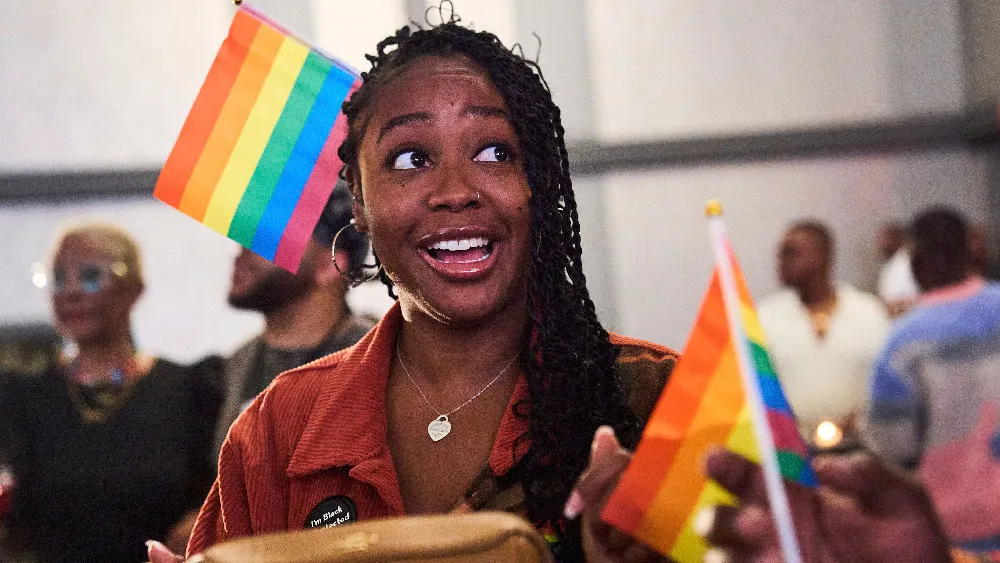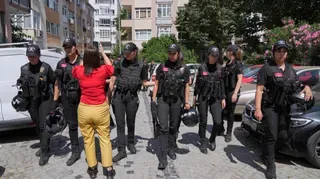May 28, 2013
Trans Latinas Seek City Funds
Kilian Melloy READ TIME: 6 MIN.
As transgender Latinas increasingly speak out about the discrimination and harassment they experience in San Francisco's Mission district, a nonprofit is asking city officials to fund its work to prevent such violence.
El/La Para Translatinas emerged in 2006 after Proyecto ContraSIDA Por Vida, where it had been a program, lost its funding. It is mainly volunteer-led but has been able to tap into HIV funds in order to hire three part-time staffers.
In 2012 El/La estimates it saw 300 trans Latinas utilize its services.
"What we have at El/La is a lot of expertise and a lot of trust with trans Latinas. We created a space for trans Latinas and actually built community," said Marcia Ochoa, El/La's unpaid program director.
Ochoa, who lives in Santa Cruz and teaches at the UC campus there, helped start El/La and travels to the city several times a week for the agency. Her academic work focuses on structural violence that trans women experience in Latin America and helped shape the agency's approach.
"It is about the emergence of the trans movement and political consciousness now," said Ochoa, 42, who is gender variant and identifies as a butch lesbian.
As the discourse around the needs of the transgender community has matured, said Ochoa, there has been greater awareness that trans people are oftentimes excluded in efforts to fight poverty or violence.
"It used to be when people thought about these bread and butter issues that queer and trans people were not seen as 'part of' but seen as 'additional' to it," she said.
Or policies meant to help ended up working against trans people. Ochoa pointed to homeless shelters as one example where certain rules can prevent trans people from accessing such housing.
"We are moving into a new period where finally we are having some recognition of not only trans women in particular but transgender people in general," said Ochoa.
For years the city's Department of Public Health has prioritized transgender women as being in need of HIV prevention services. As part of a collaborative of local agencies serving this population, El/La has received $90,000 a year that pays for an office coordinator, a health education coordinator, and an outreach coordinator who all work part-time.
El/La is now seeking an additional $80,000 from the city in order to hire a full-time case manager and expand the work it is doing around the domestic violence that trans Latinas experience.
"It would really supplement and complement what we are able to do," said Ochoa.
Violence against trans Latinas "is not a recent thing," pointed out Isa Noyola, 34, a transgender woman who has been with El/La for six years and serves as its volunteer office manager.
"Every year we are having to advocate for our community," she said. "We are dealing with the trauma that walks through our door when we are open for drop-in hours."
She added that El/La is "running at a very high level with very little. To me that is not sustainable."
In March El/La took part in a rally held to focus attention on several violent episodes involving trans women in the Mission. That led to the agency working with the office of gay District 9 Supervisor David Campos, who represents the Mission, on ways to bolster its funding.
Campos has become a vocal backer of El/La and helped raise $5,000 for the agency during a fundraiser last weekend that also netted enough money to save Mission gay bar Esta Noche.
He invited several El/La staffers and clients, including Noyola, to speak at a recent budget hearing Campos co-hosted with Mayor Ed Lee and gay District 8 Supervisor Scott Wiener. And he again pointed to the need for additional city resources for trans Latinas during a hearing he held last week at City Hall about the violence directed toward trans women.
"We need to set up a meeting with the key players to come up with a comprehensive strategy around the budget in terms of what additional resources are needed," Campos said during the May 16 hearing before the supervisors' Neighborhood Services and Safety Committee, which he chairs. "We need to create domestic violence funding for the trans community."
El/La has also courted support this year from the San Francisco Domestic Violence Consortium, a collaborative between 17 agencies that advocates around the issue and lobbies for funding.
"We are certainly on their side and want them to be successful," said Beverly Upton, the consortium's executive director.
The agency has begun conversations with the San Francisco Commission on the Status of Women about its funding process. While it has awarded grants to several nonprofits that serve transgender women, the commission has never directly funded an agency whose sole focus is on transgender clients.
Emily M. Murase, Ph.D., executive director of the city's Commission on the Status of Women, attended and spoke at the board hearing. In a later interview with the Bay Area Reporter, she said that she recognizes there is an urgent need to address the issues brought up both in public and during a private meeting she had with El/La.
"Really, the extent of the harm of the violence against this particular demographic has become painfully clear to this department recently. So in the light of that, clearly there is unmet need here and we would like to do what we can," said Murase. "We are looking to see what options are available for how can we improve San Francisco's response."
The commission operates on a three-year funding cycle. For fiscal years 2011-2012 through 2013-2014 it selected 25 different agencies, two of which are LGBT-focused, to share in $3.2 million earmarked for violence against women programs. It did not receive any requests for funding from a trans-specific program.
The commission is currently working on its next requests for funding, which would begin July 1, 2014. It is expected the lack of trans women programs will be highlighted in its next community needs assessment to be released sometime later this year.
It is possible that some funding for a trans program could be allocated off-cycle this year. If that were the case, El/La would have a chance to apply.
Ochoa expressed optimism about El/La receiving funding from the city for additional staff going forward.
"We are always cautiously optimistic," she said. "We could put them in place right away and make a huge difference in the lives of the people we work with day to day."
Until now the trans Latina program has not actively fought for additional funds, mainly due to being short staffed.
Noyola works full-time overseeing the workforce program for paid internships for LGBT youth at LYRIC, the Lavender Youth Recreation and Information Center. The agency serves as El/La's fiscal sponsor and does receive funding from the Commission on the Status of Women for its Queer Young Women's Health and Safety Project.
"For us, I think, we have kept insular for many reasons. We are definitely focused on the priorities of our women," Noyola told the B.A.R. "Our capacity to be part of so many different conversations in the city has been limited. To me, it is about kind of looking at reprioritizing where we are getting support."
Nor was El/La aware there is a vacant seat currently on the Commission on the Status of Women until asked about it by the B.A.R. The seat has been open since October.
The mayor appoints all seven commissioners who serve four-year terms. Currently, there is one lesbian member, political consultant Andrea Shorter.
There has not been a transgender appointee since March 2009, when Nikki Calma, also known by her drag name Tita Aida, resigned. Her appointment in 2008 marked the first time a trans woman had served on the commission.
It is unclear why Lee has yet to fill the seat, or if he is considering naming a trans woman. His spokespeople did not respond to the B.A.R. 's request for comment, while staffers at the commission were unaware of a trans woman applying for the vacancy.
While Noyola and Ochoa both stated they believe it is important for a trans woman to serve on the commission, neither was sure they would have the time to do so themselves as they are already juggling their duties at their paid jobs with their volunteer work.
Part of their mission is to build the leadership skills of the women El/La serves so they can be public advocates. That can be difficult, though, when many of the trans women they see do not speak English.
"We are starting from the ground up. It has been challenging finding resources for our community that is linguistically appropriate," said Noyola. "The fact our women are coming out to speak publicly is due to our work. There needs to be representation, whether myself or someone else, who can speak for the trans Latina community, the immigrant community, and the monolingual community."
El/La is located at 2940 16th Street, Suite 319, at Capp. It is open Tuesday to Friday from 5 to 9 p.m.
For more information, visit http://www.ellaparatranslatinas.org/about-us.php.
Kilian Melloy serves as EDGE Media Network's Associate Arts Editor and Staff Contributor. His professional memberships include the National Lesbian & Gay Journalists Association, the Boston Online Film Critics Association, The Gay and Lesbian Entertainment Critics Association, and the Boston Theater Critics Association's Elliot Norton Awards Committee.






